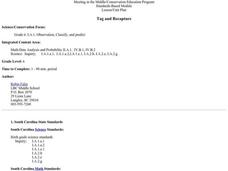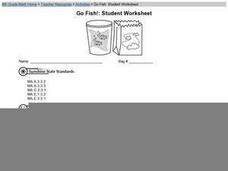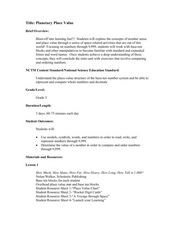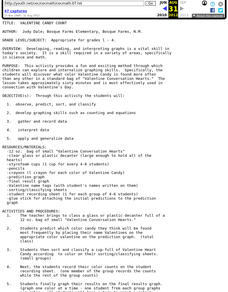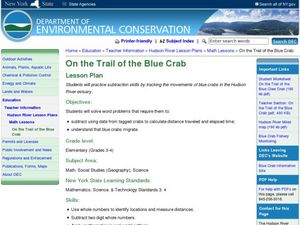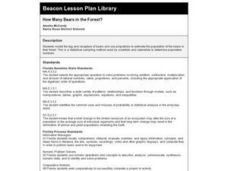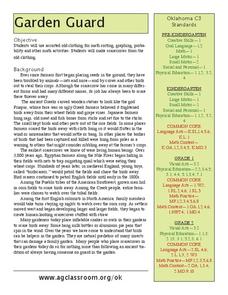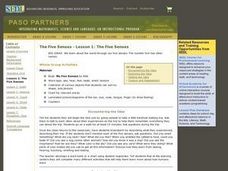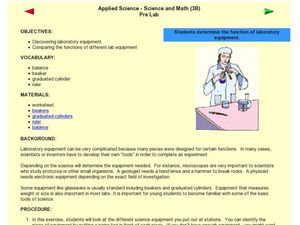Curated OER
Tag and Recapture
Sixth graders participate in an activity in which colored jelly beans represent fish in a lake--10 green jellybeans per "lake" representing tagged fish. They draw from the beans (fish) and record the number of tagged fish they draw...
Curated OER
Go Fish! Student Worksheet
A math and science worksheet prompts learners to simulate how scientists determine populations of animals out in the wild. They use goldfish crackers, paper bags, and a styrofoam cup as their tools. An excellent cooperative group activity!
Curated OER
Go Fish
Help learners discover methods to estimate animal population. They will participate in a simulation of catching and tagging fish in order to estimate the fish population. They scoop and count goldfish crackers, record data, and use...
Curated OER
Butterfly Math
In this math word problems instructional activity, students complete words problems having to do with butterflies. Students complete 6 problems total and click on the links in the questions to help them.
National Wildlife Federation
How Many Bison?
Math and science to the rescue! Some basic math concepts help scientists predict wildlife populations. Using tokens, groups simulate tagging a wildlife population. They then use proportions to estimate the population of the wildlife.
Curated OER
CATCH, TAG and RELEASE
Students apply estimation strategies for problem-solving purposes. They become familiar with one aspect of a marine biologist's work.
Curated OER
Planetary Place Value
Third graders explore place value to the ten thousands place. This incredibly thorough, 24-page lesson has learners construct, order, and compare numbers to 9,999. This three-day lesson includes reteaching and extension activities...
Curated OER
Wildlife Sampling
Seventh graders discuss water issues and its affect on salmon population. They recreate a sampling river with fish (cheddar) and scoop them to tag them (which means they exchange them for pretzel fish.) They complete a spreadsheet to...
Curated OER
Valentine Candy Count
Here is an imaginative take on a classic lesson! Young scholars discover what color Valentine Candy is found more often than any other in a standard bag of Valentine Conversation Hearts. They observe, predict, sort, and classify the data...
Curated OER
Go Fish!
Young scholars collect data, interpret data summarize proportional reasoning. Students determine (with various alternate goods) the number of fish in a nearby pond. Young scholars capture the goldfish crackers, deal with pretzels and...
Curated OER
On the Trail of the Blue Crab
Third graders read the article "Blue Claw," discuss crab migration, and look at a map of the Hudson River. They complete a worksheet where they must use subtraction to determine the distance migrating crabs travel.Web links, article, and...
Curated OER
Striking a Balance
High schoolers participate in an activity that demonstrates the principles and dynamics of food chains. They discover that the sun's energy is captured by individual plants and transferred to animals.
Curated OER
How Many Bears in the Forest?
Third graders model the tag and recapture of bears and use proportions to estimate the population of the bears in their forest. This is a statistical sampling method used by scientists and naturalists to determine population numbers.
Curated OER
Fish Count
In this science worksheet, young scholars read about how scientists determine the total number of fish in a population. Students also participate in a related math activity.
Curated OER
Garden Guard
Students read about the history of farming with the use of scarecrows and then sort clothing, build scarecrows, write descriptions, and more. In this scarecrows lesson plan, students also play a game called Garden Tag.
Curated OER
Touch
Students discover how sense of touch helps us explore our world by feeling it and learning the size, texture and shape of things.
Curated OER
Sight
Students discover how the sense of sight helps us recognize each other and explore color, motion and distance.
Curated OER
The Five Senses - Barefoot Walking Trip
Young scholars go outside and take a little barefoot walking trip. They talk to each other about their experiences on the trip to help them remember everything they can. They go on a walk for at least 15 minutes. Ask questions during the...
Curated OER
Get Ready, Get Set, Hibernate
Students match each body part or idea from a work bank about methods of animal adaptations for winter survival. They observe as the first one, food is covered with the whole class before completing the rest of the diagram. They discuss...
Curated OER
Involving Community Members, Parents, and Community Agencies in Student Learning
Students predict and estimate the number of moose shot by people between the years of 1986-1990. They analyze data and statistics, construct bar graphs, and conduct research on the Alaskan moose.
Curated OER
Garden Tag
Students create mini "gardens" in recycled clothing boxes. They recycle old seed and flower catalogs and "plant" cut-out flowers in their gardens.
Curated OER
Applied Science -- Science and Math (3B) Pre Lab
Set up stations around your science lab to introduce youngsters to different equipment. They examine a beaker, graduated cylinder, ruler, balance, and thermometer. The said worksheet is not included, but you will find a few useful tips...
Curated OER
Mark-and-Recapture
Students investigate the mark-and-recapture method for estimating the population of an animal species. They evaluate given data to answer a set of questions.
Curated OER
Collecting the Rays
Students investigate the affect shape has on the ability of a solar panel to collect sunlight. In this collecting sunlight using a solar panel lesson, students determine which solar panel shape collects the most sunlight. ...
